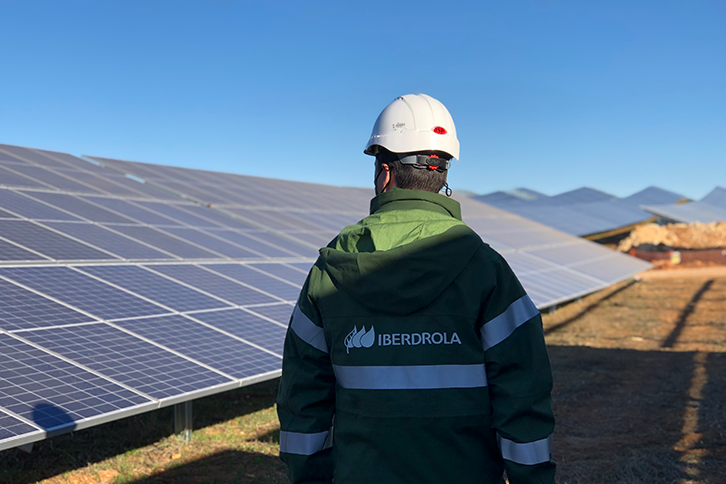Press releases
-
13/04/2023We accelerate ESG criteria at our 20,000 suppliers worldwide Iberdrola is a driving force in the area of environmental, social and governance (ESG) criteria, three pillars that form part of its DNA. For this reason, the company will require from this year onwards that more than 85% of its purchases are made from suppliers that comply with the aforementioned criteria, according to its strategic plan until 2025. Thus, the electricity company will promote best practices in 20,000 suppliers, from which it made purchases worth 17.8 billion euros last year. Iberdrola raises the bar significantly with respect to its previous targets, set in 2021, when it established that at least 70% of its main bidders, those making annual purchases worth more than one million euros, meet the established ESG criteria and are subject to sustainable development policies and standards. As part of its responsibility as a driving company, Iberdrola's ESG plan in the supply chain was not intended to exclude companies that had not paid sufficient attention in this area, but rather to encourage the entire chain to align itself with the company's principles. To this end, it has established a mechanism for proposing ESG improvement plans through which it has attracted more than 1,000 suppliers that initially did not meet the level of requirement, of which more than half have ended the 2020-22 three-year period being sustainable. Thanks to the efforts made, 77% of the main suppliers were sustainable at the end of the period. Iberdrola's supplier must first accept the Supplier Code of Ethics in order to enter into a business relationship with the company. This includes principles of action and clauses on respect for human rights, diversity and equality, occupational health and safety, anti-fraud and corruption measures, and respect for the environment, among other issues. Iberdrola thus seeks supplies and suppliers that, in addition to being sustainable, are transparent, solvent, fair, ethical, and technically competitive. For this reason, it evaluates the supplier during the purchasing process to ascertain the potential risk of the contract. The company verifies that its modus operandi is in line with the group's policies, principles and responsibilities. With regard to the requirement for ethical behaviour, monitoring is carried out in which the supplier is analysed, as well as its parent and subsidiary companies, management and shareholders. This screening seeks to identify sanctions, adverse news or indications of non-compliance in terms of compliance and human rights. In terms of financial requirements, a credit assessment is carried out to determine their financial solvency, an assessment that is carried out at each relevant tender or award and on an ongoing basis with annual follow-up and monitoring. Depending on the service or supply, they are required to meet requirements in terms of cybersecurity, occupational risk prevention, environmental management, including the requirement to provide ISO certifications. For the period 2023-2025, the current ESG measurement model, which is fully consolidated and integrated into procurement decision-making, will be maintained. Purchasing managers incorporate sustainability in their conversations with suppliers at the same level as they previously did with more traditional aspects such as price or quality. In addition, the plan for ESG supplier audits (more than 50 planned in 2023) and supplier recognition will continue with Global Supplier of the Year Awards events (2023 and 2025) and local awards (2024). In order to meet the ambitious commitment to be neutral in all its operations by 2040, new action plans specifically linked to the fight against climate change are being considered. These include improving the measurement of supplier emissions as a first step towards reduction plans through process electrification and circular economy, among others. It also proposes specific campaigns, for example on green steel, deforestation, biodiversity and sustainable mobility. Support for the local fabric Iberdrola follows a strategy of developing local suppliers for its strategic procurements, which has allowed for the creation of indirect jobs and the maintenance of a strong industrial fabric in the geographies in which it does business. The percentage of local purchases in 2022 was above 87%. The number of indirect jobs generated by the group's purchasing volume is around 400,000. Navantia, Windar, Ormazabal, Ingeteam and Haizea Wind, for example, are some of the Spanish companies in which Iberdrola has placed its trust for the construction of critical components for its Wikinger (Germany) and East Anglia ONE (UK) offshore wind farms and those under development, such as Saint Brieuc (France). These companies are thus expanding their capabilities in this sector of the future for small and medium-sized Spanish companies, which are also suppliers. In its search for allies to boost the development of industry and the energy sector, the company has made purchases from more than 4,500 Spanish suppliers worth more than €2.7 billion during 2022, a figure that represents a growth of more than 12% compared to the €2.4 billion in 2021. READ MORE
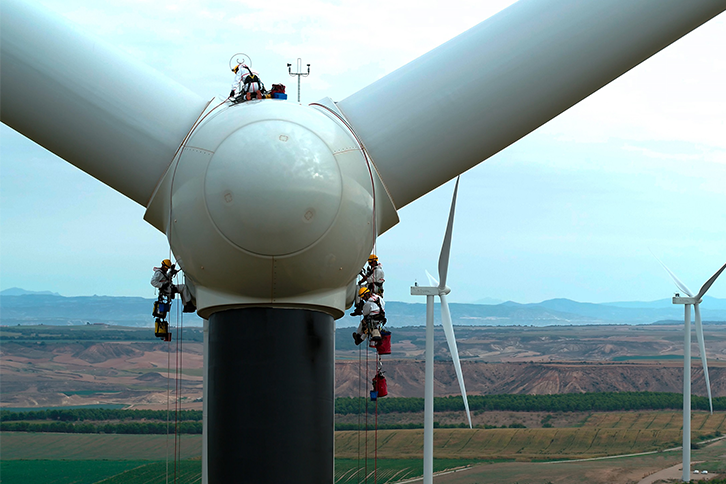
-
11/04/2023We are developing battery recycling in Spain, together with FCC and Glencore, as a commitment to the circular economy FCC Ámbito, a subsidiary of FCC Servicios Medio Ambiente, and Iberdrola, through its PERSEO Venture Builder programme , will collaborate with Glencore to tackle one of the biggest medium- and long-term challenges in the energy sector and will seek to provide industrial-scale lithium-ion battery recycling solutions on the Iberian Peninsula through the development of a specialised facility. Glencore is one of the world's largest diversified natural resource companies and a major producer, recycler and marketer of key metals for battery production. FCC Ámbito is the subsidiary of FCC Servicios Medio Ambiente, leader in Spain and Portugal in the integrated management of industrial and commercial waste. Iberdrola is a world leader in renewable energy and, through its PERSEO Venture Builder programme, aims to facilitate access to the technologies of the future with a focus on sustainability. Together, the parties will combine their capabilities to develop comprehensive management solutions for lithium batteries from both manufacturing rejects and end-of-life batteries. In collaboration with the Iberian Energy Storage Research Centre (CIIAE), the parties have carried out an in-depth analysis of the potential battery recycling market in the Iberian Peninsula and are working to identify the right technology partners to carry out the facility. The plant, which will be operated by FCC Ámbito, will allow the pre-separation of lithium-ion batteries for subsequent refining. To this end, this alliance will seek to establish the strategic arrangements necessary for the effective recovery of lithium batteries, extending the positive impact of the initiative to other actors along the entire value chain. It will also contribute to the research and development necessary for the effective circularity of these materials. The exponential adoption of electric vehicles will lead to a rapid increase in battery recalls - which will be around 35,000 metric tonnes per year in Spain by 2035 - and new battery manufacturing rejects. In this context, this collaboration aims to develop an industrial facility that will be ready when such recycling capacities are required on the peninsula. In this way, FCC and Iberdrola are extending the collaboration they began to tackle the recycling of wind turbine blades , for which purpose they created the company EnergyLoop. This new effort further reinforces the circular economy strategies of FCC Ámbito and Iberdrola, which see this model of production and consumption as a key lever for the energy transition. Kunal Sinha, Global Head of Recycling at Glencore, emphasised that "we are delighted to be part of this alliance on battery circularity with Iberdrola, a world leader in renewable energy, and FCC Servicios Medio Ambiente, a leader in waste management services in Spain and Portugal. Together, we will seek to leverage the individual strengths of each company to bring circularity to the lithium-ion battery ecosystem in the Iberian Peninsula. This collaboration supports our ambition to grow our recycling business in new markets. We are excited to drive this initiative in Spain, where Glencore has operated one of the world's largest zinc smelters since 1960. At Glencore, we see production waste and post-consumer materials as valuable resources that will help meet the growing demand for the critical metals that underpin the energy transition and the global ambition to achieve net-zero emissions”. María Jesús Kaifer, Technical Director and Head of Circular Economy at FCC Ámbito, highlighted that "with this collaboration, our company continues its pursuit of strategic growth objectives, on which it has been working, such as the development of recycling solutions for materials related to the energy transition. It is a continuation of our commitment to the recovery of resources contained in waste in order to minimise dependence on raw materials. The recycling of lithium-ion batteries is a challenge we are facing together with two leading companies in their sectors, Iberdrola and Glencore, in order to join forces to ensure the necessary recycling capacities. Álvaro Portellano, Head of PERSEO Venture Builder at Iberdrola, commented that "sustainable business models are at the core of Iberdrola's strategy, which is demonstrated by more than two decades of leadership in the global renewable industry and in driving the transition to a decarbonised economy. At Iberdrola, we see this new collaboration as a valuable opportunity to contribute to the circularity of the elements of the energy transition that we are driving, as well as expanding the scope of our successful partnership with FCC, which is already addressing the recycling of wind turbine blades. In 2020, the PERSEO Venture Builder programme was launched to promote the development of innovative industries such as, among others, those related to the circular economy. In that regard, we are excited to combine that objective with the strengths and capabilities of Glencore and FCC, global leaders in the natural resources and waste management industries, respectively, to lead the recycling of lithium-ion batteries in the Iberian Peninsula". Aligned with FCC Environment's Sustainability Strategy 2050 FCC Ámbito is the subsidiary of FCC Servicios Medio Ambiente specialising in the integrated management of industrial and commercial waste, recovery of by-products and soil decontamination. As a whole, it has a total of 39 treatment centres in Spain and Portugal, with more than 67 processing lines that guarantee the functionality of the facilities. FCC Servicios Medio Ambiente is the FCC Group company that has been providing municipal services and integrated waste management for 120 years, serving more than 60 million people in 5,200 municipalities around the world. In 2021, the company managed 24 million tonnes of waste and produced nearly four million tonnes of secondary raw materials and fuel derived from waste. FCC Ámbito contributes its extensive experience in the recycling and marketing of secondary raw materials for the definition of the operational processes in the development of the projects arising from this alliance. The incorporation of new technologies in this type of project will allow FCC Ámbito to consolidate and position itself as a key player in the country's circular economy processes, a fundamental pillar of FCC Environment's 2050 Sustainability Strategy. This Sustainability Strategy consists of a 30-year business development roadmap that integrates very demanding objectives and commitments with high added value for the company and society as a whole, and which are grouped into four lines of action: environmental, social, excellence and good governance. The circular economy, at the core of the Iberdrola Group's sustainable business model This collaboration responds to Iberdrola's commitment to a sustainable energy model and is part of its PERSEO Venture Builder programme to promote the development of innovative industrial companies working in new areas of electrification and in sectors that are difficult to decarbonise. Iberdrola defines its circular economy strategy as a process that affects its entire value chain, both its own production processes and those of its suppliers and customers. The group prioritises the contracting of companies with environmental management systems and, together with its suppliers, promotes eco-design, the analysis of the life cycle of products, and the use of materials with a low environmental impact. The company also promotes the circular economy by reducing the use of natural resources through its commitment to decarbonisation and electrification , and the more sustainable use of natural resources by promoting the use of more efficient and cleaner technologies and processes. It also encourages research to develop solutions for waste use and promotes responsible consumption through environmental awareness programmes. Since its creation in 2008, PERSEO has invested €100 million in start-ups that develop innovative technologies and business models, focusing on those that improve the sustainability of the energy sector through greater electrification and decarbonisation of the economy. The programme has focused its actions on the analysis of business opportunities and technological collaboration with start-ups and emerging companies around the world. Through PERSEO, the Venture Builder programme was launched in 2020 with €40 million for the creation of new business models aimed at supporting electrification in sectors that are difficult to decarbonise and the development of circular economy solutions, among others. Glencore: recycling towards a true circular economy Glencore recognises its responsibility to contribute to the global effort to achieve the Paris Agreement targets through decarbonising its own carbon footprint and takes a holistic approach to its global industrial emissions. Against the 2019 baseline scenario, Glencore is committed to reducing its Scope 1, 2 and 3 industrial emissions by 15% by the end of 2026, 50% by the end of 2035 and has an ambition to achieve zero net industrial emissions by the end of 2050. This collaboration strengthens Glencore's recycling platform, which provides infrastructure to contribute to the goals of a circular economy. Through its industrial assets, Glencore has over 75 years of experience in the recycling business and actively recycles copper, nickel, cobalt, zinc and precious metals. By recycling these metals responsibly, it contributes to the circular economy, removing materials from landfills and helping to reduce environmental impacts. Aiming to expand its recycling footprint across the commodity complex, it is looking to invest in capacity expansions in our core markets of Europe and North America, and to enter new markets that currently lack formal and responsible recycling points for end-of-life materials. Glencore seeks to significantly expand its role in recycling in the metals chain necessary for the decarbonisation of the economy. There is a growing recognition of the need to increase the use of secondary metals, for which its recycling business is well positioned. READ MORE
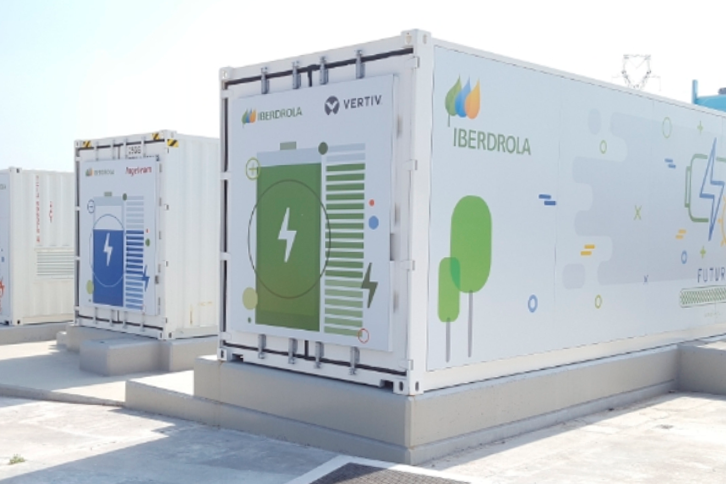
-
08/04/2023We present our accelerated Climate Transition Plan to the United Nations Iberdrola has presented its Climate Transition Plan to the United Nations to achieve zero net emissions by 2040 in response to the call of the UN Secretary General, following a realistic, ambitious and responsible line. The specific objective is based on achieving carbon neutrality of generation plants, its electricity distribution activity and its own consumption (scopes 1 and 2) by 2030 and net zero emissions in the entire value chain by 2040, with a science-based approach and an intermediate milestone pathway. On the one hand, a robust investment plan and levers for action, with a focus on achieving 100% renewable energy and smart grids, and driving fundamentally green procurement and climate solutions for its consumers. All of this is supported by solid technological and industrial partnerships. Secondly, an accelerated action scheme based on values grounded in just transition : this has to be "people-positive" and "nature-positive". And finally, an architecture of alliances, partnerships and public participation contributions at local, regional and global levels fully aligned with an ambitious approach to climate action. Gonzalo Saénz de Miera, Director of Climate Change and Alliances at Iberdrola, added that "the presentation of this Plan to the UN ratifies the work that Iberdrola has been doing for years, with a clear commitment to accelerating decarbonisation and the implementation of renewable energies that help us to fight global warming in a positive way for people and nature. We are in the best position to work together with the UN and in alliances with third parties and to set an example to the rest of the world". With the climate crisis worsening and the gap in meeting the Paris Agreement targets, as shown by the recent report of the Intergovernmental Panel on Climate Change (IPCC), Antonio Guterres called on the business sector to lead action by presenting accelerated climate transition plans ahead of the climate summit to be held next September in New York in the framework of the United Nations Assembly. These plans, to move towards net zero emissions, must be aligned with the ten recommendations of the Secretary-General's own High-Level Panel of Experts report. These recommendations set out the elements for climate targets and associated plans to be comprehensive and avoid "green washing": net zero emissions must be achieved by 2050 along the entire value chain including a pathway of interim targets; the plan must be transparent, science-based and backed by a robust investment plan based on renewable energy and with a focus on just transition and biodiversity protection; and companies' public and lobbying activities must be geared in the same direction to promote climate ambition at the private and governmental level. A line of work Iberdrola presented its Climate Action Plan at COP 27 in Sharm el Sheikh (Egypt), the most ambitious presented by a company at the Summit, which brought forward the goal of carbon neutrality of generation plants, its electricity distribution activity and its own consumption (scopes 1 and 2) to 2030, and the total decarbonisation of its activities by 2040. This makes the company the energy company with the most ambitious targets in this area. Iberdrola also presented its Biodiversity Plan at the World Biodiversity Summit in Canada, with the goal of achieving a net positive impact on species and ecosystems by 2030. The Plan addresses the impacts of the group's activities on nature throughout the life cycle of its facilities, considering the supply chain and creating environmental, economic, and social value through ecosystem services. Beyond these and other plans, Iberdrola is promoting, through various collaborative initiatives in its business alliances, such as the Spanish Green Growth Group and the Corporate Leaders Group, the implementation of the recommendations of the United Nations Group of Experts for the business sector to accelerate its transition to an emission-free, more competitive and robust economy. READ MORE
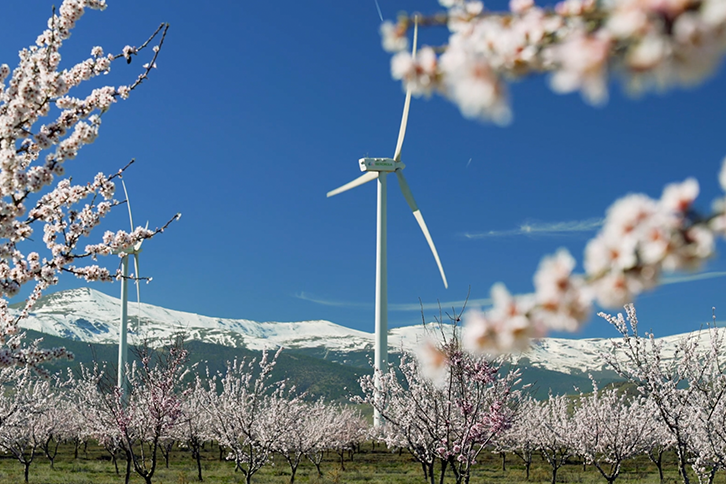
-
05/04/2023We present to Europe a project to manufacture photovoltaic panels in Spain Iberdrola has submitted a photovoltaic panel manufacturing project to the third call of the Innovation Fund, the European Commission's grant programme for the demonstration of innovative technologies to reduce emissions. The manufacturing plant will have a production capacity of 1.6 GW per year, equivalent to 3 million panels, and could cover a third of the current demand for such equipment in Spain. A significant part of the production of these panels will be installed in Extremadura itself, as it is the leading region for this technology in Spain with a market share of around 25%. This new industry will boost local economic development with the creation of 500 direct jobs. This initiative will require European funding to ensure its competitiveness. It could be framed within the "Net Zero Industry Act", the package of measures recently announced by the European Commission to strengthen the resilience and competitiveness of emission-free manufacturing technologies in Europe, as well as to ensure a more secure and sustainable energy system. This new programme is inspired by the US Inflation Reduction Act. Specific support for the manufacture of photovoltaic panels is still to be finalised, and could provide the economic support for production needed to make local manufacturing of essential components for the energy transition competitive. Commitment to innovation and industry The opening of this new factory in Europe responds to Iberdrola's interest in achieving competitive manufacturing at the European Union level and in seeking solutions on the continent to achieve greater energy self-sufficiency and lower emissions by investing in renewables, grids, storage and green hydrogen and supporting the development of innovative industrial companies. Thanks to a strategy of anticipation, which transcends all the company's business units and all its geographical areas, Iberdrola is today the private utility that invests most in R&D worldwide, allocating more than €2 billion in the last decade. Along these lines, the company plans to exceed €4 billion of investment in Innovation, Development and Research (R&D&I) activities by 2030, doubling its investment in this area by the end of the decade. In 2008, Iberdrola created its PERSEO programme to promote the development of start-ups and innovative industrial companies working in new areas of electrification and in sectors that are difficult to decarbonise. Since its creation, it has invested €175 million in businesses that develop innovative technologies, focusing on those that improve the sustainability of the energy sector through greater electrification and decarbonisation of the economy. Extremadura, a spearhead Extremadura plays a key role in Iberdrola's renewable expansion in Spain. In total, the energy company has more than twenty renewable facilities in the community with an installed green power capacity of more than 4,000 MW, of which 2,000 MW correspond to the 12 solar plants it has in operation in the region. The region is also of particular importance to the company in its development of hydroelectric power. In Extremadura, it has eight hydroelectric plants with an installed capacity of more than 2,000 megawatts (MW) of renewable energy. The region will continue to stand out in Iberdrola's development in the coming years. In the 2020-2025 period alone, more than 2,800 MW of renewable energy will have been installed, with an investment of more than €1.7 billion, which will have generated approximately 7,400 jobs over the five-year period. The company chaired by Ignacio Sánchez Galán will also soon start up its first solar community in Spain for an entire village in the town of Cedillo in Cáceres. This initiative will enable local residents to reduce their electricity bills by between 30% and 50%, while at the same time contributing to the development of this town and tackling depopulation. World leader in renewable energy The Iberdrola group began its commitment to renewable energies more than two decades ago as a fundamental pillar on which to build a clean, reliable and intelligent business model. Thanks to this vision, the company is today a world leader in renewable energies, with 40,000 MW of renewable energy in operation by the end of 2022 and 7,675 MW to be executed in the next four years, and is leading the energy transition towards a low-emission economy. Its 2025 Strategic Plan envisages investment of €17 billion in renewable businesses. Thanks to these investments, Iberdrola will increase its installed renewable capacity by 12,100 MW to 52,000 MW in 2025 - 3,100 MW of onshore wind, 6,300 MW of photovoltaic, 1,800 MW of offshore, 700 MW of batteries and 200 MW of hydro. READ MORE
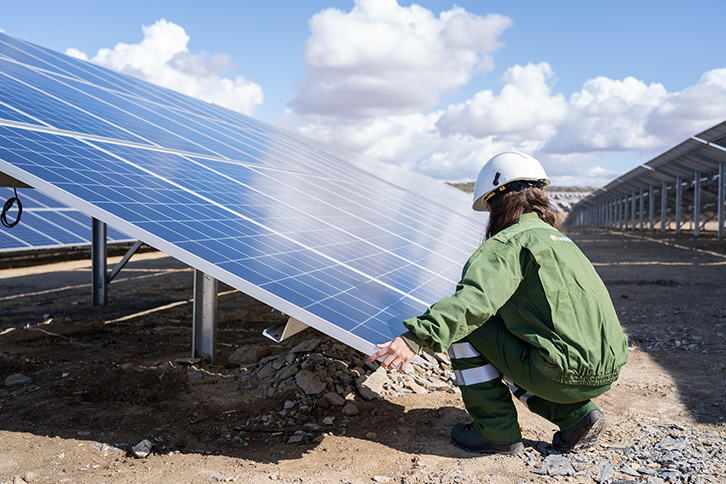
-
04/04/2023Galán and AMLO meet and announce their commitment to the development of renewable energies in Mexico The Chairman of Iberdrola, Ignacio Galán, and the President of the Mexican Government, Andrés Manuel López Obrador, met this morning and announced the start of a new phase following the signing of an agreement of intent between subsidiaries of Iberdrola México and México Infrastructure Partners ("MIP"), announced today. Both presidents are committed to advancing the development of renewable energy in the country. The operation will be supported by the Government of Mexico through the financial support of the Mexican National Infrastructure Fund (Fonadin) and other public financial entities. Iberdrola, firmly committed to renewable energy development in Mexico Iberdrola confirms its commitment to Mexico by reaffirming its leadership as the leading private generator of renewable energy with the backing of the Federal Government to continue operating its assets under market conditions and drive the energy transition in the country. In addition, Iberdrola Mexico will continue to serve its existing customers, and both parties will work together to try to resolve the various disputes that have arisen in the country in recent years. Andrés Manuel López Obrador, President of the Mexican Government, has declared that "the agreement reached with Iberdrola, which allows progress to be made in the implementation of Mexico's new energy policy, marks the beginning of a new stage in which the company will actively participate in the country's renewable energy development". Ignacio Galán, Chairman of Iberdrola, said that "Iberdrola is grateful for the support and flexibility shown by the Mexican government in reaching this agreement, and considers Mexico a strategic country with potential for growth and expansion, where it will show its support for Mexico and the state by developing renewable capacity". "The New Iberdrola Mexico" presentation [PDF] READ MORE
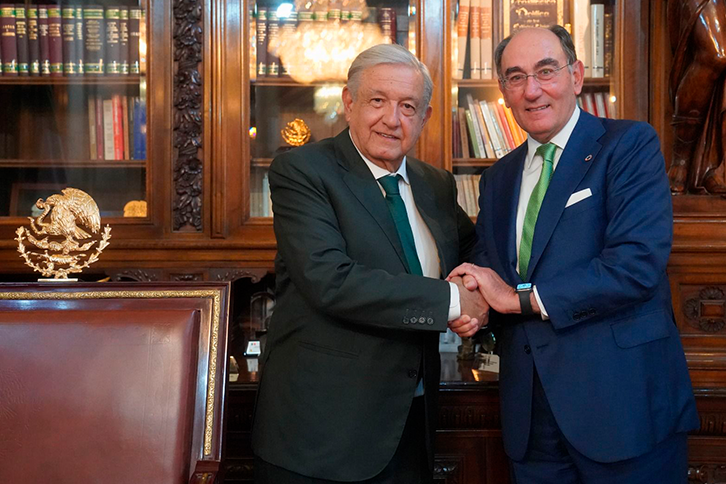
-
04/04/2023We signed an agreement to sell more than 8,400 MW of combined cycle gas in Mexico for $6 billion Iberdrola Mexico and Mexico Infrastructure Partners (MIP) have today signed a memorandum of understanding, whereby the trust led and managed by MIP will acquire 8,539 MW of installed capacity. Of the total, 8,436 MW corresponds to combined cycle gas and 103 MW to wind. Of the plants included in the agreement, 87% of the total installed capacity to be divested currently operate under the regime of Independent Energy Producers, contracted with the Federal Electricity Commission (CFE). These plants include the combined cycles of Monterrey I and II, Altamira III and IV, Altamira V, Escobedo, La Laguna, Tamazunchale I, Baja California, Topolobampo II and Topolobampo III, as well as the wind asset La Venta III. The privately operated combined cycle gas plants of Monterrey III and IV, Tamazunchale II and Enertek are also included in the agreement. The agreed value for the sale amounts to approximately $6 billion, which may be modified based on the closing date of the transaction and other adjustments. The transaction is subject to the agreement and the signing of definitive contracts by the parties, as well as obtaining the necessary regulatory approvals and the fulfilment of certain conditions that are standard in this type of operation. The operation has the financial support of the National Infrastructure Fund of Mexico (Fonadin) and other public financial entities associated with the Government of Mexico. The Iberdrola Group, through the new investments it will carry out in Mexico, will reaffirm its leadership in the development of renewable energy in the country. READ MORE
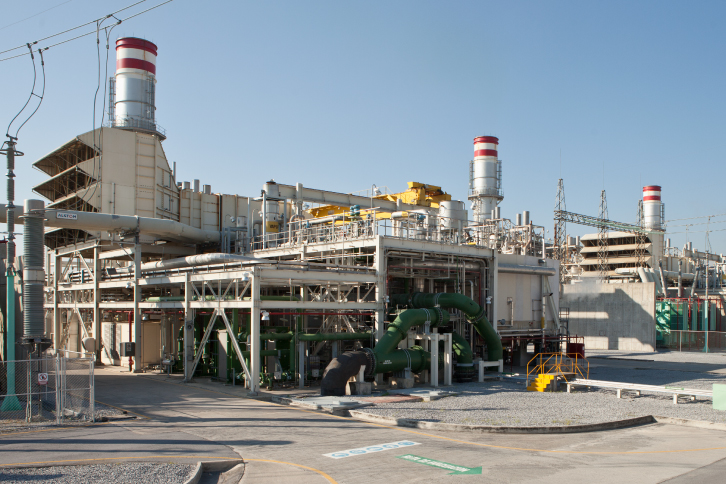
-
03/04/2023Iberdrola Supera Awards: €300,000 for the best equality projects in sport Iberdrola has opened the submission period for the projects that will compete in what is already the fourth edition of the Iberdrola Supera Awards , solidarity awards designed to promote gender equality by awarding €300,000 to the best projects in favour of women's excellence through sport. This year, in addition to the five fixed categories of each edition, the Iberdrola Supera Innovation Award will be added, an award for the project that best defends among its objectives the promotion of research, development and innovation in the field of sport. With this one, there will be a total of six categories that will frame the projects that will compete for €50,000, thus reaching €300,000 in prizes. They are those related to the promotion of grassroots sport among girls up to 16 years of age (Supera Base); with the support for the incorporation of women in competition (Supera Competition); with the inclusion of women with special abilities in sport (Supera Inclusion); with the integration of women in society through sport (Supera Social); and with the increase in the visibility of women's sport (Supera Dissemination), in addition to the aforementioned Supera Innovation. Applications may be submitted until 4 June and, from among them, a Jury of Honour made up of renowned personalities from the world of sport will select the winning projects. The 2022 edition received more than 600 applications from associations, sports clubs and federations, schools, institutes and public or private entities. Among the projects selected were those submitted by the Getxo Skating and Roller Hockey Sports Club (Basque Country), the Pingüinos Rugby Sports Club of Burgos (Castile and León), the Delikia Sports Club (Galicia), the Algeciras Rowing Club (Andalusia), the ExtTV channel (Extremadura) and Affit Amparo Folch (Valencian Community). The Iberdrola Supera Awards are aligned with the Sustainable Development Goals (SDGs) of the United Nations 2030 Agenda for 2030, specifically with Goal 5 (Gender equality and empowerment of women) and, with this, Iberdrola increases the support it provides to women athletes to help them achieve their goals and advance in equality. In addition, since 2016, the company has been the main promoter of women's sports in Spain. It already supports 32 National Federations, promoting more than 600,000 federated women, 2 out of every 3 federated women, and has more than 100 competitions with Iberdrola's own name, including 32 leagues. Iberdrola Supera Awards Legal Bases (Spanish Version) READ MORE
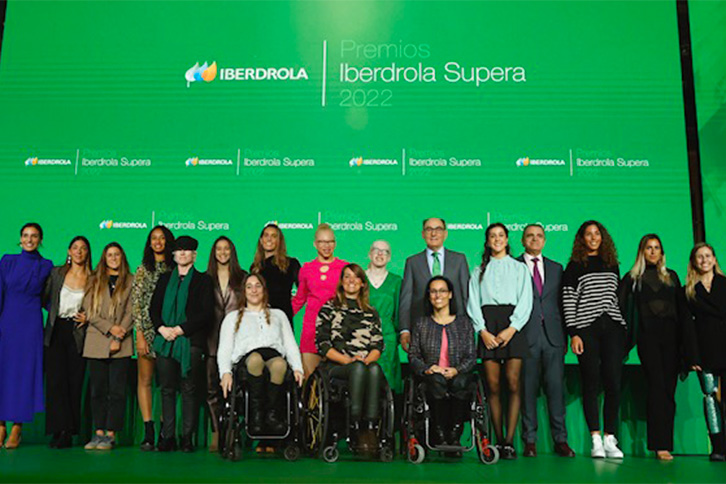
-
31/03/2023We strengthen our strategic alliance with MAPFRE to reach almost 450 MW of renewable energy in Spain Iberdrola and MAPFRE are strengthening their strategic alliance in the energy sector in Spain. Both companies have added 150 new photovoltaic megawatts (MW) to the company created two years ago, bringing the total to 445 MW: 295 MW wind and 150 MW photovoltaic, through Energías Renovables Ibermap. This pioneering co-investment vehicle envisages the incorporation of more assets in the future. The 150 MW of new capacity corresponds to operational photovoltaic plants - Almaraz , Olmedilla and Romeral, with 50 MW each - located in Castilla-La Mancha and Extremadura. These plants are in addition to the 295 MW of wind power already incorporated in 2021 in Burgos, Almeria, Malaga, Seville, Soria and Tarragona. This transaction increases the joint investment in renewable energies between two leading companies, while diversifying the portfolio with new solar photovoltaic assets. Thanks to the inclusion of these new assets, Iberdrola becomes the majority shareholder with 51% of the company, while MAPFRE consolidates its position with the remaining 49%. This new shareholding configuration provides a series of advantages, including, for example, that Ibermap will have a larger and more diversified portfolio, including solar photovoltaic plant assets, which provides greater stability and security in cash flows. In addition, assets with a longer useful life than the existing ones will be contributed to the vehicle. Iberdrola, commitment to Spain Iberdrola has been leading the energy transition for two decades, acting as a key driving force in the transformation of the industrial fabric, the economy and employment. To this end, the company has launched a historic investment plan of €47 billion between 2023 and 2025 , with which it intends to increase its renewable capacity, its smart grids and take advantage of the opportunities of the energy revolution facing the world's leading economies. In Spain, investments to 2025 amount to €6 billion, mainly earmarked for the deployment of renewables and smart grids. Iberdrola is currently reaffirming its commitment to the energy transition in Spain as a leader in renewable energies, with almost 20,000 MW of renewable energy in the country. After investments of €140 billion over the last twenty years, the group is a leader in renewable energy with almost 40,000 MW installed worldwide, a volume that makes its generation park one of the cleanest in the energy sector. MAPFRE, committed to ESG alternatives MAPFRE increased its commitment to alternative assets in 2018 with the best partners in the market and always with a strong ESG component. In addition to the renewable energy sector, it has launched real estate, infrastructure, private equity and private debt funds. In total, it has commitments amounting to €1.35 billion, helping it to diversify an investment portfolio of more than €41 billion. MAPFRE is a global insurance company. A benchmark company in the Spanish market, it is the largest Spanish insurer in the world, the leading insurance group in Latin America and the sixth largest non-life insurer in Europe in terms of premium volume. MAPFRE has more than 31,000 employees and, in 2022, its revenues exceeded €29.5 billion and net profit stood at €642 million. READ MORE
